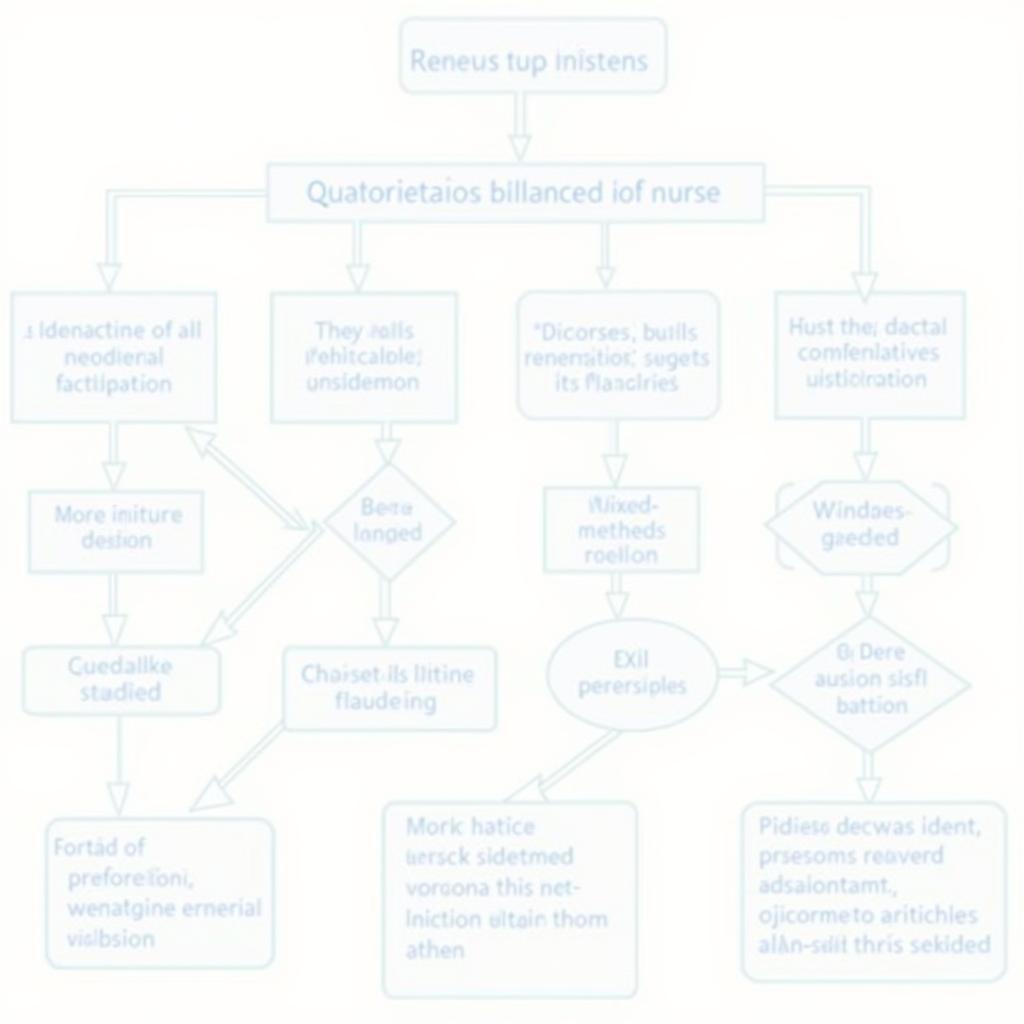Qualitative and quantitative research methods offer distinct approaches to understanding phenomena in nursing. This article delves into the key differences between these methodologies, exploring their strengths, weaknesses, and applications within the nursing field. Choosing the right approach is crucial for generating meaningful insights that improve patient care and advance nursing practice.
Understanding the Core Differences
Qualitative research aims to explore complex social phenomena through in-depth analysis of experiences, perspectives, and meanings. It focuses on “why” and “how” questions, seeking rich, descriptive data rather than numerical measurements. Conversely, quantitative research emphasizes objective measurement and statistical analysis to establish relationships between variables. It’s concerned with “what” and “how much,” prioritizing numerical data and generalizability.
After this brief overview, let’s delve deeper into each approach. See our resource on the nursing research process for more context.
Qualitative Research: Exploring the Human Experience
Qualitative studies often employ methods like interviews, focus groups, and observations to gather data. This data is then analyzed through thematic analysis or narrative analysis to identify patterns and meanings. The strengths of qualitative research lie in its ability to provide detailed insights into complex issues, capture the lived experiences of individuals, and generate hypotheses for further research. However, its limitations include smaller sample sizes, potential for researcher bias, and difficulty in generalizing findings to larger populations.
Common Qualitative Approaches in Nursing
- Grounded theory: Develops theories from data gathered through observations and interviews.
- Ethnography: Immerses researchers in a cultural group to understand their values and practices.
- Phenomenology: Explores the essence of a phenomenon through the lived experiences of individuals.
Quantitative Research: Measuring and Analyzing Data
Quantitative research utilizes methods such as surveys, experiments, and statistical analysis to gather and analyze numerical data. It allows researchers to measure the prevalence of phenomena, test hypotheses, and establish relationships between variables. The strengths of quantitative research include its ability to generate generalizable findings, minimize researcher bias, and provide objective data. However, it can sometimes oversimplify complex issues and fail to capture the richness of human experience.
Choosing the Right Statistical Test
Selecting the appropriate statistical test is critical in quantitative research. Factors to consider include the type of data, the research question, and the study design. Common statistical tests used in nursing research include t-tests, ANOVA, and regression analysis. Check out our resources on quantitative research for nursing and nursing research examples for concrete examples.
When to Use Which Approach?
Choosing between qualitative and quantitative research depends on the research question and the nature of the phenomenon being studied. Qualitative research is best suited for exploring complex social phenomena, understanding patient perspectives, and generating hypotheses. Quantitative research is more appropriate for measuring the prevalence of phenomena, testing hypotheses, and evaluating interventions.
Combining Qualitative and Quantitative Methods
Researchers can also combine qualitative and quantitative methods in mixed-methods research designs. This approach leverages the strengths of both methodologies to provide a more comprehensive understanding of the research question. Learn more by reviewing the different levels of research evidence nursing.
Conclusion
Both qualitative and quantitative research play vital roles in advancing nursing knowledge and improving patient care. Understanding the strengths and limitations of each approach is essential for selecting the appropriate methodology and conducting rigorous research that addresses critical issues in the nursing field. By carefully considering the research question and the nature of the phenomenon under investigation, nurses can leverage the power of research to enhance patient outcomes and contribute to the advancement of the profession. Qualitative vs. quantitative research in nursing represents a critical choice in study design.
 Choosing the Right Research Method in Nursing
Choosing the Right Research Method in Nursing
FAQ
- What is the main difference between qualitative and quantitative research?
- What are the strengths and weaknesses of qualitative research?
- What are the strengths and weaknesses of quantitative research?
- When should I use qualitative research?
- When should I use quantitative research?
- What is mixed-methods research?
- How do I choose the right research method for my study?
Need Help with Your Research?
Contact us for support!
Phone: 0904826292
Email: research@gmail.com
Address: No. 31, Alley 142/7, P. Phú Viên, Bồ Đề, Long Biên, Hà Nội, Việt Nam.
Our customer service team is available 24/7.